Unit 2 How often do you exercise? SectionB (3a-Self Check)课件
文档属性
| 名称 | Unit 2 How often do you exercise? SectionB (3a-Self Check)课件 |  | |
| 格式 | zip | ||
| 文件大小 | 3.9MB | ||
| 资源类型 | 教案 | ||
| 版本资源 | 人教新目标(Go for it)版 | ||
| 科目 | 英语 | ||
| 更新时间 | 2021-08-26 13:49:03 | ||
图片预览

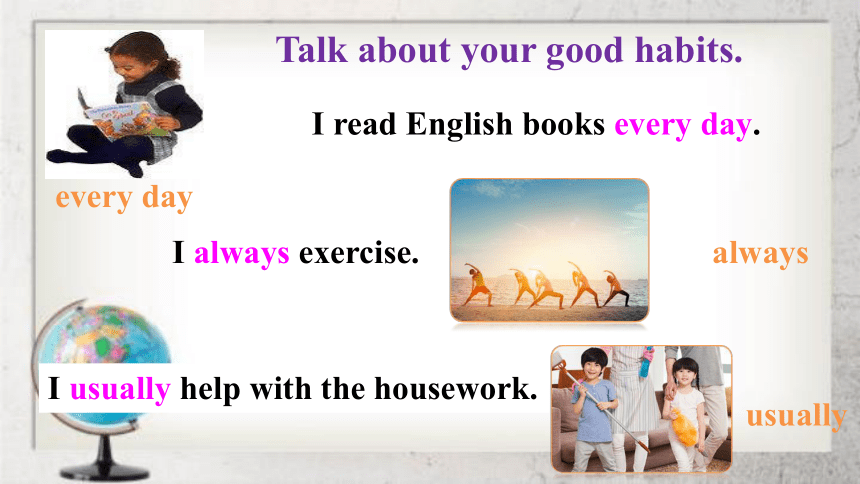
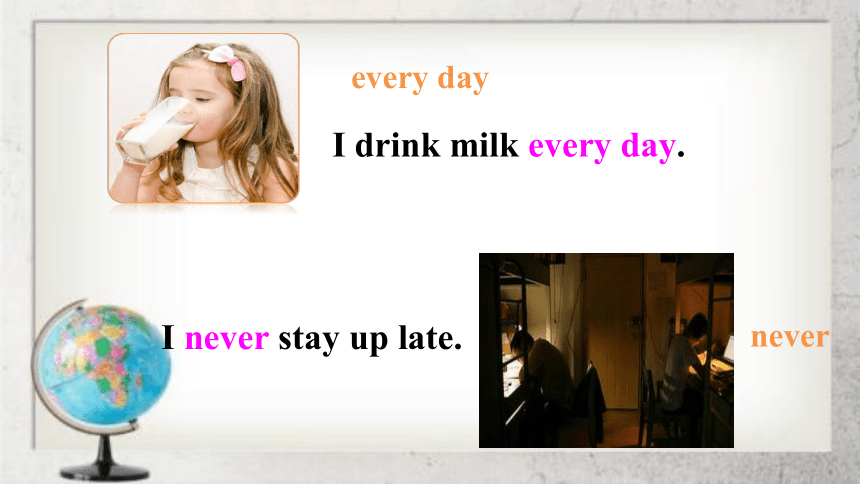
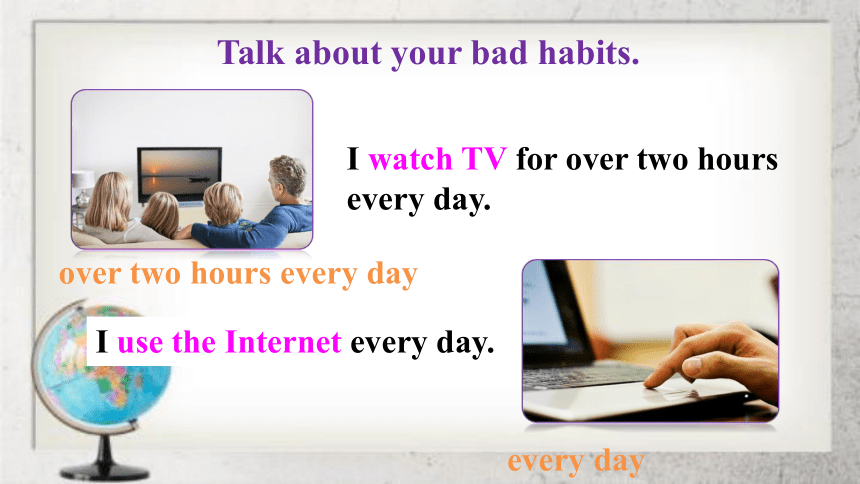
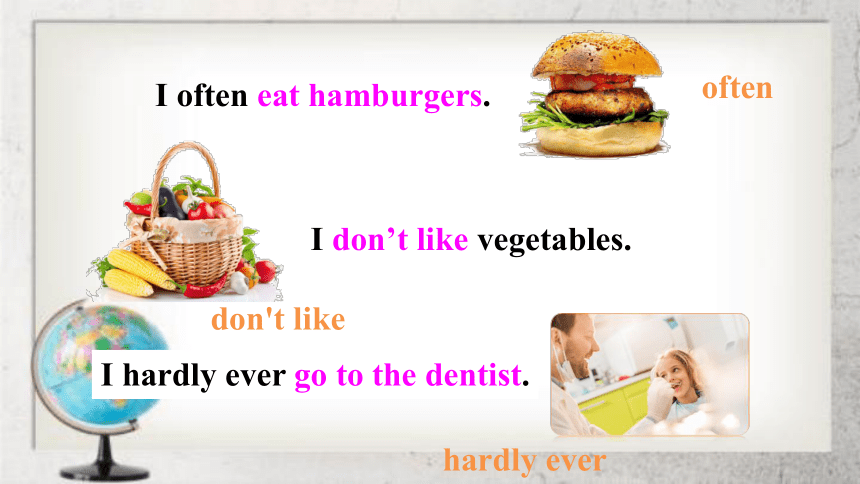

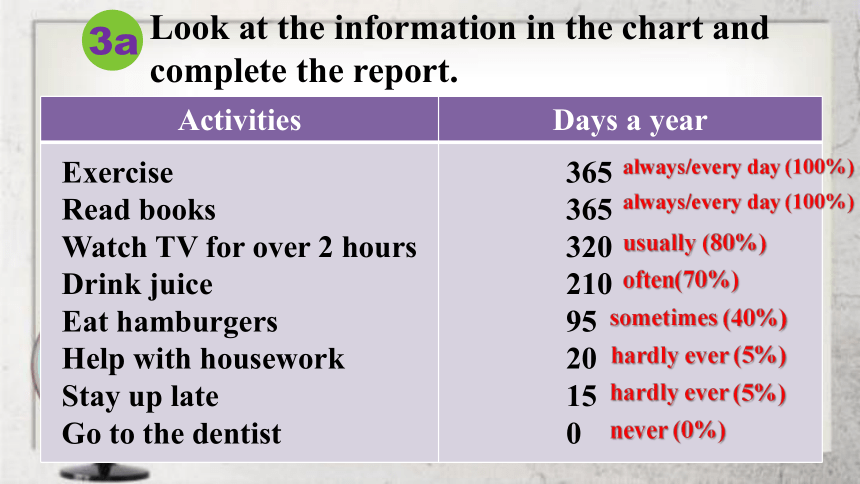

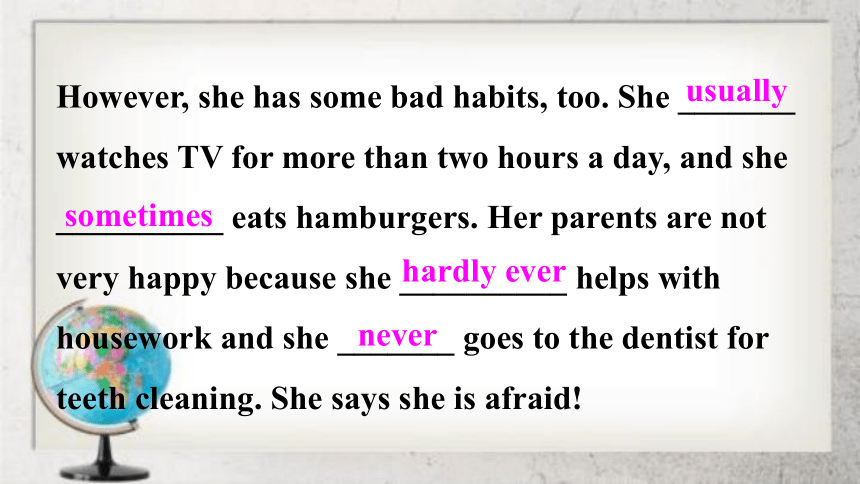
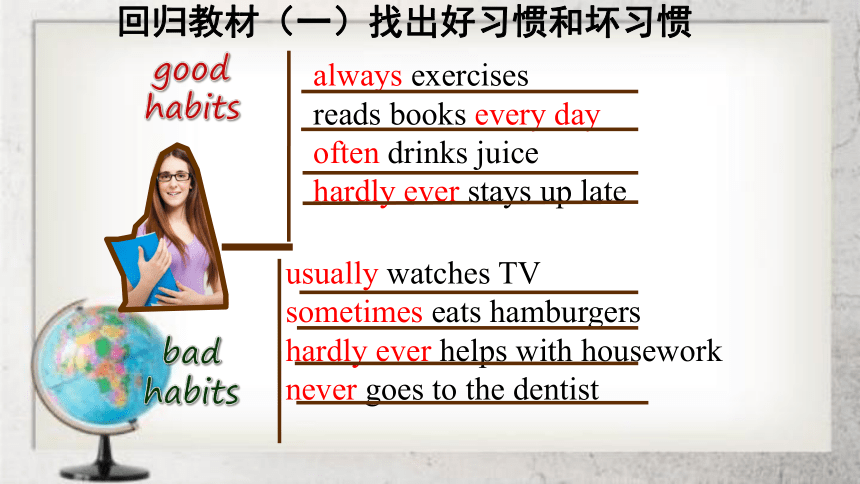


文档简介
(共49张PPT)
Unit
2
How
often
do
you
exercise?
R·八年级上册
Section
B
3a-Self
Check
Talk
about
your
good
habits.
I
read
English
books
every
day.
I
always
exercise.
I
usually
help
with
the
housework.
every
day
always
usually
I
drink
milk
every
day.
I
never
stay
up
late.
every
day
never
Talk
about
your
bad
habits.
I
use
the
Internet
every
day.
I
watch
TV
for
over
two
hours
every
day.
over
two
hours
every
day
every
day
I
hardly
ever
go
to
the
dentist.
I
don’t
like
vegetables.
I
often
eat
hamburgers.
often
don't
like
hardly
ever
Look
at
the
information
in
the
chart
and
complete
the
report.
Activities
Days
a
year
Exercise
Read
books
Watch
TV
for
over
2
hours
Drink
juice
Eat
hamburgers
Help
with
housework
Stay
up
late
Go
to
the
dentist
365
365
320
210
95
20
15
0
3a
always/every
day
(100%)
always/every
day
(100%)
usually
(80%)
often(70%)
sometimes
(40%)
hardly
ever
(5%)
hardly
ever
(5%)
never
(0%)
Jane
is
a
16-year-old
high
school
student
in
the
United
States.
American
Teenager
magazine
asked
her
about
her
habits.
Jane
has
a
lot
of
good
habits.
She
always
exercises
and
she
reads
books
__________.
Also,
she
_______
drinks
juice
and
she
___________
stays
up
late.
every
day
often
hardly
ever
However,
she
has
some
bad
habits,
too.
She
_______
watches
TV
for
more
than
two
hours
a
day,
and
she
__________
eats
hamburgers.
Her
parents
are
not
very
happy
because
she
__________
helps
with
housework
and
she
_______
goes
to
the
dentist
for
teeth
cleaning.
She
says
she
is
afraid!
usually
sometimes
hardly
ever
never
always
exercises
reads
books
every
day
often
drinks
juice
hardly
ever
stays
up
late
usually
watches
TV
sometimes
eats
hamburgers
hardly
ever
helps
with
housework
never
goes
to
the
dentist
good
habits
bad
habits
回归教材(一)找出好习惯和坏习惯
1.
However
副词,意为“然而,可是”,表示转折关系,可放
在句首、句中和句末。
Language
points
例:我很饿,但她却给了我一些水。
I
was
hungry,
however,
she
gave
me
some
water.
可是我父亲没有开车去那里。
My
father,
however,
didn’t
drive
there.
2.
more
than
意为“多于”,相当于over
;
其反义词为less
than
,意为“少于”
。
例:回家用时从未超过一个小时。
It
never
takes
more
than/over
an
hour
to
go
home.
他们会在那里呆不到三天。
They’ll
stay
there
for
less
than
three
days.
(湖北十堰中考)
—Many
boy
students
think
math
is
_______English.
—I
agree.
I’m
weak
in
English.
A.
much
difficult
than
B.
so
difficult
as
C.
less
difficult
than
D.
more
difficult
than
【中考对接】
Complete
the
chart
with
your
own
information.
In
the
last
column,
use
expressions
like
always,
every
day,
twice
a
week
and
never.
Activities
How
often?
Good
habits
Bad
habits
3b
Example
Habits
Activities
How
often?
Good
habits
every
day
always
every
day
never
four
times
a
week
Exercise
Read
books
Eat
fruit
Drink
milk
Stay
up
late…
Habits
Activities
How
often
Bad
habits
Watch
TV
for
over
2
hours
Use
the
Internet
Eat
hamburgers
Help
with
housework
Go
to
the
dentist…
always
often
every
day
hardly
ever
never
What
do
you
think
of
good
habits?
1.
They
are
good
for
my
health.
2.
A
healthy
lifestyle
helps
me
get
good
grades.
3.
They
are
healthy
for
the
mind
and
the
body.
What
do
you
think
of
bad
habits?
1.
They
are
bad
for
my
health.
2.
They
are
not
good
for
my
study.
3.
We
should
change
the
bad
habits.
4.
We
should
say
“No”
to
the
bad
habits.
Can
you
find
the
linking
words
in
3a?
Linking
Words
连接词
Jane
is
a
16-year-old
high
school
student
in
the
United
States.
American
Teenager
magazine
asked
her
about
her
habits.
Jane
has
a
lot
of
good
habits.
She
always
exercises
and
she
reads
books
every
day.
Also,
she
often
drinks
juice
and
she
hardly
ever
stays
up
late.
However,
she
has
some
bad
habits,
too.
She
usually
watches
TV
for
more
than
two
hours
a
day,
and
she
sometimes
eat
hamburgers.
Her
parents
are
not
very
happy
because
she
sometimes
helps
with
housework
and
she
never
goes
to
the
dentist
for
teeth
cleaning.
She
says
she
is
afraid!
回归教材(二)找出连接词。
回归教材(三)分析结构
Jane
is
a
16-year-old
high
school
student
in
the
United
States.
American
Teenager
magazine
asked
her
about
her
habits.
Jane
has
a
lot
of
good
habits.
She
always
exercises
and
she
reads
books
every
day.
Also,
she
often
drinks
juice
and
she
hardly
ever
stays
up
late.
However,
she
has
some
bad
habits,
too.
She
usually
watches
TV
for
more
than
two
hours
a
day,
and
she
sometimes
eat
hamburgers.
Her
parents
are
not
very
happy
because
she
sometimes
helps
with
housework
and
she
never
goes
to
the
dentist
for
teeth
cleaning.
She
says
she
is
afraid!
__________________________________________________________________________________________________________________________________________________________________
Write
a
possible
ending.
Everyone
has
different
habits.
But
if
it
is
good
or
bad,
that’s
up
to
you
to
decide.
We
should
keep
the
good
habits
and
try
to
change
or
say
“No”
to
the
bad
ones.
What’s
your
idea?
_____________________________________
_____________________________________
_____________________________________
_____________________________________
_____________________________________
_____________________________________
Write
a
report
about
your
good
and
bad
habits.
Say
how
often
you
do
things.
Use
the
report
in
3a
as
an
example.
3c
1.
写自己日常生活中的好习惯与坏习惯,应用一般
现在时态。
2.
首先,将自己的好、坏习惯列个清单,标明自己
做这些事情的频率。
3.
然后,依次将这些事情完整地表达出来。
4.
最后,通读一遍自己的文章,看有没有错误的地方。
写作指导
Beginning:介绍自己的信息。
(background)
Body:
____
have
____
good
habits.
1.____________________
2.____________________
3.____________________
good
However,
____
have
____
bad
habits,too.
1.____________________
2.____________________
3.____________________
bad
Ending
Out-
line
exercise
like
eating
fruit
and
vegetables
eat
good
breakfast
stay
up
late
go
online
for
more
than
two
hours
ride
my
bike
too
fast
1.
I
think
we
should
have
more
good
habits.
Because
they
are
good
for
our
health.
2.
Good
habits
are
good
for
us.
We
should
have
more
good
habits.
4.
Good
habbits
are
good
for
us.
We
should
keep
the
good
habits
and
try
to
change
or
say
“No”
to
the
bad
ones.
5.
All
in
all,
I'm
a
healthy
girl.
I
have
a
good
body.
For
my
bad
habits,
I
decide
to
change
them.
Some
good
endings:
Writing
time
My
name
is
Jane.
I
am
a
14-year-old
middle
school
student
in
China.
I
have
a
lot
of
good
habits.
I
always
exercise.
Because
exercising
is
a
good
way
to
relax
and
it’s
healthy
for
the
mind
and
the
body.
I
like
eating
fruit
and
vegetables
a
lot.
So
I
eat
an
apple
every
day.
As
we
all
know,
an
apple
a
day
keeps
the
doctor
away.
I
also
enjoy
reading.
It
makes
me
happy.
Besides,
I
eat
good
breakfast
every
day
to
keep
Possible
version
one:
beginning
me
in
good
health.
However,
nobody
is
perfect.
I
have
some
bad
habits,
too.
For
example,
although
it’s
important
to
sleep
on
time,
I
sometimes
stay
up
late.
I
often
go
online
to
playcomputer
games
for
more
than
two
hours
a
day
and
I
sometimes
ride
my
bike
too
fast.
All
in
all,
I
have
more
good
habits
than
bad
habits.
So
I
think
I
am
smart
about
my
health
most
of
the
time.
body
ending
Hello,
everyone.
I
am
Jack.
I
have
a
lot
of
good
habits.
I
always
exercise
and
I
read
books
for
one
hour
every
day.
I
usually
help
my
mother
with
the
housework
and
clean
my
room
by
myself.
I
eat
fruit
and
vegetables
every
day.
I
hardly
ever
stay
up
late
and
get
up
early.
Possible
version
two:
beginning
But
I
also
have
some
bad
habits.
I
like
playing
computer
games.
I
play
them
for
two
hours
a
day.
I
like
eating
hamburgers,
too.
I
eat
hamburgers
three
to
five
times
a
week.
It’s
bad
for
my
health.
But
I
can’t
get
rid
of
it.
body
ending
Take
the
health
quiz.
Compare
your
results
with
your
partner’s.
Who’s
healthier?
1.
How
often
do
you
eat
breakfast?
a.
Never
b.
A
few
times
a
week
c.
Almost
every
day.
2.
How
often
do
you
eat
fast
food?
a.
Never
b.
A
few
times
a
week
c.
Almost
every
day
4
3.
How
often
do
you
eat
vegetables
and
fruit?
a.
Never
b.
A
few
times
a
week
c.
Almost
every
day
4.
How
often
do
you
exercise?
a.
A
few
times
a
year
b.
A
few
times
a
month
c.
A
few
times
a
week
5.
How
many
hours
do
you
watch
TV
every
week?
a.
None
b.
One
to
four
c.
Five
or
more
6.
How
many
hours
do
you
usually
sleep
at
night?
a.
Less
than
six.
b.
Six
or
seven
c.
Eight
or
more
1.a=0,
b=1,c=2
2.a=2,
b=1,c=0
3.a=0,
b=1,c=2
4.a=0,
b=1,c=2
5.a=2,
b=1,c=0
6.a=0,
b=1,c=2
9-12
points:
You’re
really
healthy!
Good
for
you—and
your
health!
4-8
points:
You’re
smart
about
your
health
most
of
the
time.
0-3
points:
You
have
to
learn
more
about
healthy
habits.
Don’t
worry—
you
can
do
it!
Are
you
healthy?
1.
Almost
every
day.
几乎每天。
almost为程度副词,“几乎;差不多”。一般置于实义动词之前,连系动词、助动词和情态动词之后,一般不置于句末。
Language
points
例:快点,该上学了。
Hurry
up,
it
is
almost
time
for
school.
这几乎就像一场美梦。
It
was
almost
like
a
good
dream.
almost:
“几乎”,可与no,
nothing,
none,
never等
连用,此时不能用nearly代替。
nearly:“将近”,一般是用在具体的数字的前面。
almost与nearly
例:几乎一个没剩。
这条河将近一百米宽。
The
river
is
_______
100
meters
wide.
There
is
_______
none
left.
nearly
almost
1.
Complete
the
chart
with
activities
you
do
and
don’t
do.
What
about
your
mother/
father?
always
usually
often
sometimes
hardly
ever
never
I
My
mother
or
father
Self
check
I
My
mother/father
always
usually
often
sometimes
hardly
ever
never
play
basketball
play
chess
read
books
read
newspapers
eat
hamburgers
eat
chicken
drink
juice
drink
tea
watch
TV
use
the
Internet
stay
up
late
get
up
early
Example
2.
Write
five
sentences
using
the
information
above.
I
hardly
ever
watch
TV.
I
always
play
basketball
after
school.
My
father
always
plays
chess
on
weekends.
I
usually
read
books
on
weekends.
My
father
sometimes
drinks
tea.
3.
Fill
in
the
blanks
in
the
conversation.
A:
What
do
Tom
and
Mike
do
on
weekends?
B:
They
sometimes
go
to
the
museum.
A:
do
they
go
to
the
shopping
center?
B:
ever.
Maybe
about
twice
a
month.
A:
do
they
watch
TV?
B:
Mike
never
watches
TV,
but
Tom
watches
TV
______
day.
A:
Oh,
I’m
just
like
Tom.
I
watch
TV,
too.
usually
How
often
Hardly
How
often
every
always
1.
We
______
go
out
to
eat
but
not
very
often.
A.
usually
B.
always
C.
never
D.
sometimes
2.
—
________
do
you
read
English?
—
Every
evening.
A.
How
long
B.
How
often
C.
How
far
D.
How
much
Exercise
一、单项选择。
3.
Maria
likes
______
every
morning.
A.
running
B.
ran
C.
runs
D.
run
4.
My
sister
likes
fruit
_______
she
doesn’t
like
vegetables.
A.
and
B.
but
C.
or
D.
also
5.
—_____
do
you
eat
junk
food?
—About
once
a
week.
A.
How
B.
How
many
C.
How
long
D.
How
often
二、连词成句。
1.
how,
do,
computer,
often,
play,
you,
games
2.
how,
movies,
does,
Jim,
often,
go,
to
How
often
do
you
play
computer
games?
How
often
does
Jim
go
to
movies?
3.
do,
twice,
watch,
you,
TV,
a
week
4.
most,
three,
or,
a,
week,
exercise,
students,
times,
four
5.
favorite,
is,
what,
program,
your
Do
you
watch
TV
twice
a
week?
Most
students
exercise
three
or
four
times
a
week.
What
is
your
favorite
program?
Thank
you
Unit
2
How
often
do
you
exercise?
R·八年级上册
Section
B
3a-Self
Check
Talk
about
your
good
habits.
I
read
English
books
every
day.
I
always
exercise.
I
usually
help
with
the
housework.
every
day
always
usually
I
drink
milk
every
day.
I
never
stay
up
late.
every
day
never
Talk
about
your
bad
habits.
I
use
the
Internet
every
day.
I
watch
TV
for
over
two
hours
every
day.
over
two
hours
every
day
every
day
I
hardly
ever
go
to
the
dentist.
I
don’t
like
vegetables.
I
often
eat
hamburgers.
often
don't
like
hardly
ever
Look
at
the
information
in
the
chart
and
complete
the
report.
Activities
Days
a
year
Exercise
Read
books
Watch
TV
for
over
2
hours
Drink
juice
Eat
hamburgers
Help
with
housework
Stay
up
late
Go
to
the
dentist
365
365
320
210
95
20
15
0
3a
always/every
day
(100%)
always/every
day
(100%)
usually
(80%)
often(70%)
sometimes
(40%)
hardly
ever
(5%)
hardly
ever
(5%)
never
(0%)
Jane
is
a
16-year-old
high
school
student
in
the
United
States.
American
Teenager
magazine
asked
her
about
her
habits.
Jane
has
a
lot
of
good
habits.
She
always
exercises
and
she
reads
books
__________.
Also,
she
_______
drinks
juice
and
she
___________
stays
up
late.
every
day
often
hardly
ever
However,
she
has
some
bad
habits,
too.
She
_______
watches
TV
for
more
than
two
hours
a
day,
and
she
__________
eats
hamburgers.
Her
parents
are
not
very
happy
because
she
__________
helps
with
housework
and
she
_______
goes
to
the
dentist
for
teeth
cleaning.
She
says
she
is
afraid!
usually
sometimes
hardly
ever
never
always
exercises
reads
books
every
day
often
drinks
juice
hardly
ever
stays
up
late
usually
watches
TV
sometimes
eats
hamburgers
hardly
ever
helps
with
housework
never
goes
to
the
dentist
good
habits
bad
habits
回归教材(一)找出好习惯和坏习惯
1.
However
副词,意为“然而,可是”,表示转折关系,可放
在句首、句中和句末。
Language
points
例:我很饿,但她却给了我一些水。
I
was
hungry,
however,
she
gave
me
some
water.
可是我父亲没有开车去那里。
My
father,
however,
didn’t
drive
there.
2.
more
than
意为“多于”,相当于over
;
其反义词为less
than
,意为“少于”
。
例:回家用时从未超过一个小时。
It
never
takes
more
than/over
an
hour
to
go
home.
他们会在那里呆不到三天。
They’ll
stay
there
for
less
than
three
days.
(湖北十堰中考)
—Many
boy
students
think
math
is
_______English.
—I
agree.
I’m
weak
in
English.
A.
much
difficult
than
B.
so
difficult
as
C.
less
difficult
than
D.
more
difficult
than
【中考对接】
Complete
the
chart
with
your
own
information.
In
the
last
column,
use
expressions
like
always,
every
day,
twice
a
week
and
never.
Activities
How
often?
Good
habits
Bad
habits
3b
Example
Habits
Activities
How
often?
Good
habits
every
day
always
every
day
never
four
times
a
week
Exercise
Read
books
Eat
fruit
Drink
milk
Stay
up
late…
Habits
Activities
How
often
Bad
habits
Watch
TV
for
over
2
hours
Use
the
Internet
Eat
hamburgers
Help
with
housework
Go
to
the
dentist…
always
often
every
day
hardly
ever
never
What
do
you
think
of
good
habits?
1.
They
are
good
for
my
health.
2.
A
healthy
lifestyle
helps
me
get
good
grades.
3.
They
are
healthy
for
the
mind
and
the
body.
What
do
you
think
of
bad
habits?
1.
They
are
bad
for
my
health.
2.
They
are
not
good
for
my
study.
3.
We
should
change
the
bad
habits.
4.
We
should
say
“No”
to
the
bad
habits.
Can
you
find
the
linking
words
in
3a?
Linking
Words
连接词
Jane
is
a
16-year-old
high
school
student
in
the
United
States.
American
Teenager
magazine
asked
her
about
her
habits.
Jane
has
a
lot
of
good
habits.
She
always
exercises
and
she
reads
books
every
day.
Also,
she
often
drinks
juice
and
she
hardly
ever
stays
up
late.
However,
she
has
some
bad
habits,
too.
She
usually
watches
TV
for
more
than
two
hours
a
day,
and
she
sometimes
eat
hamburgers.
Her
parents
are
not
very
happy
because
she
sometimes
helps
with
housework
and
she
never
goes
to
the
dentist
for
teeth
cleaning.
She
says
she
is
afraid!
回归教材(二)找出连接词。
回归教材(三)分析结构
Jane
is
a
16-year-old
high
school
student
in
the
United
States.
American
Teenager
magazine
asked
her
about
her
habits.
Jane
has
a
lot
of
good
habits.
She
always
exercises
and
she
reads
books
every
day.
Also,
she
often
drinks
juice
and
she
hardly
ever
stays
up
late.
However,
she
has
some
bad
habits,
too.
She
usually
watches
TV
for
more
than
two
hours
a
day,
and
she
sometimes
eat
hamburgers.
Her
parents
are
not
very
happy
because
she
sometimes
helps
with
housework
and
she
never
goes
to
the
dentist
for
teeth
cleaning.
She
says
she
is
afraid!
__________________________________________________________________________________________________________________________________________________________________
Write
a
possible
ending.
Everyone
has
different
habits.
But
if
it
is
good
or
bad,
that’s
up
to
you
to
decide.
We
should
keep
the
good
habits
and
try
to
change
or
say
“No”
to
the
bad
ones.
What’s
your
idea?
_____________________________________
_____________________________________
_____________________________________
_____________________________________
_____________________________________
_____________________________________
Write
a
report
about
your
good
and
bad
habits.
Say
how
often
you
do
things.
Use
the
report
in
3a
as
an
example.
3c
1.
写自己日常生活中的好习惯与坏习惯,应用一般
现在时态。
2.
首先,将自己的好、坏习惯列个清单,标明自己
做这些事情的频率。
3.
然后,依次将这些事情完整地表达出来。
4.
最后,通读一遍自己的文章,看有没有错误的地方。
写作指导
Beginning:介绍自己的信息。
(background)
Body:
____
have
____
good
habits.
1.____________________
2.____________________
3.____________________
good
However,
____
have
____
bad
habits,too.
1.____________________
2.____________________
3.____________________
bad
Ending
Out-
line
exercise
like
eating
fruit
and
vegetables
eat
good
breakfast
stay
up
late
go
online
for
more
than
two
hours
ride
my
bike
too
fast
1.
I
think
we
should
have
more
good
habits.
Because
they
are
good
for
our
health.
2.
Good
habits
are
good
for
us.
We
should
have
more
good
habits.
4.
Good
habbits
are
good
for
us.
We
should
keep
the
good
habits
and
try
to
change
or
say
“No”
to
the
bad
ones.
5.
All
in
all,
I'm
a
healthy
girl.
I
have
a
good
body.
For
my
bad
habits,
I
decide
to
change
them.
Some
good
endings:
Writing
time
My
name
is
Jane.
I
am
a
14-year-old
middle
school
student
in
China.
I
have
a
lot
of
good
habits.
I
always
exercise.
Because
exercising
is
a
good
way
to
relax
and
it’s
healthy
for
the
mind
and
the
body.
I
like
eating
fruit
and
vegetables
a
lot.
So
I
eat
an
apple
every
day.
As
we
all
know,
an
apple
a
day
keeps
the
doctor
away.
I
also
enjoy
reading.
It
makes
me
happy.
Besides,
I
eat
good
breakfast
every
day
to
keep
Possible
version
one:
beginning
me
in
good
health.
However,
nobody
is
perfect.
I
have
some
bad
habits,
too.
For
example,
although
it’s
important
to
sleep
on
time,
I
sometimes
stay
up
late.
I
often
go
online
to
playcomputer
games
for
more
than
two
hours
a
day
and
I
sometimes
ride
my
bike
too
fast.
All
in
all,
I
have
more
good
habits
than
bad
habits.
So
I
think
I
am
smart
about
my
health
most
of
the
time.
body
ending
Hello,
everyone.
I
am
Jack.
I
have
a
lot
of
good
habits.
I
always
exercise
and
I
read
books
for
one
hour
every
day.
I
usually
help
my
mother
with
the
housework
and
clean
my
room
by
myself.
I
eat
fruit
and
vegetables
every
day.
I
hardly
ever
stay
up
late
and
get
up
early.
Possible
version
two:
beginning
But
I
also
have
some
bad
habits.
I
like
playing
computer
games.
I
play
them
for
two
hours
a
day.
I
like
eating
hamburgers,
too.
I
eat
hamburgers
three
to
five
times
a
week.
It’s
bad
for
my
health.
But
I
can’t
get
rid
of
it.
body
ending
Take
the
health
quiz.
Compare
your
results
with
your
partner’s.
Who’s
healthier?
1.
How
often
do
you
eat
breakfast?
a.
Never
b.
A
few
times
a
week
c.
Almost
every
day.
2.
How
often
do
you
eat
fast
food?
a.
Never
b.
A
few
times
a
week
c.
Almost
every
day
4
3.
How
often
do
you
eat
vegetables
and
fruit?
a.
Never
b.
A
few
times
a
week
c.
Almost
every
day
4.
How
often
do
you
exercise?
a.
A
few
times
a
year
b.
A
few
times
a
month
c.
A
few
times
a
week
5.
How
many
hours
do
you
watch
TV
every
week?
a.
None
b.
One
to
four
c.
Five
or
more
6.
How
many
hours
do
you
usually
sleep
at
night?
a.
Less
than
six.
b.
Six
or
seven
c.
Eight
or
more
1.a=0,
b=1,c=2
2.a=2,
b=1,c=0
3.a=0,
b=1,c=2
4.a=0,
b=1,c=2
5.a=2,
b=1,c=0
6.a=0,
b=1,c=2
9-12
points:
You’re
really
healthy!
Good
for
you—and
your
health!
4-8
points:
You’re
smart
about
your
health
most
of
the
time.
0-3
points:
You
have
to
learn
more
about
healthy
habits.
Don’t
worry—
you
can
do
it!
Are
you
healthy?
1.
Almost
every
day.
几乎每天。
almost为程度副词,“几乎;差不多”。一般置于实义动词之前,连系动词、助动词和情态动词之后,一般不置于句末。
Language
points
例:快点,该上学了。
Hurry
up,
it
is
almost
time
for
school.
这几乎就像一场美梦。
It
was
almost
like
a
good
dream.
almost:
“几乎”,可与no,
nothing,
none,
never等
连用,此时不能用nearly代替。
nearly:“将近”,一般是用在具体的数字的前面。
almost与nearly
例:几乎一个没剩。
这条河将近一百米宽。
The
river
is
_______
100
meters
wide.
There
is
_______
none
left.
nearly
almost
1.
Complete
the
chart
with
activities
you
do
and
don’t
do.
What
about
your
mother/
father?
always
usually
often
sometimes
hardly
ever
never
I
My
mother
or
father
Self
check
I
My
mother/father
always
usually
often
sometimes
hardly
ever
never
play
basketball
play
chess
read
books
read
newspapers
eat
hamburgers
eat
chicken
drink
juice
drink
tea
watch
TV
use
the
Internet
stay
up
late
get
up
early
Example
2.
Write
five
sentences
using
the
information
above.
I
hardly
ever
watch
TV.
I
always
play
basketball
after
school.
My
father
always
plays
chess
on
weekends.
I
usually
read
books
on
weekends.
My
father
sometimes
drinks
tea.
3.
Fill
in
the
blanks
in
the
conversation.
A:
What
do
Tom
and
Mike
do
on
weekends?
B:
They
sometimes
go
to
the
museum.
A:
do
they
go
to
the
shopping
center?
B:
ever.
Maybe
about
twice
a
month.
A:
do
they
watch
TV?
B:
Mike
never
watches
TV,
but
Tom
watches
TV
______
day.
A:
Oh,
I’m
just
like
Tom.
I
watch
TV,
too.
usually
How
often
Hardly
How
often
every
always
1.
We
______
go
out
to
eat
but
not
very
often.
A.
usually
B.
always
C.
never
D.
sometimes
2.
—
________
do
you
read
English?
—
Every
evening.
A.
How
long
B.
How
often
C.
How
far
D.
How
much
Exercise
一、单项选择。
3.
Maria
likes
______
every
morning.
A.
running
B.
ran
C.
runs
D.
run
4.
My
sister
likes
fruit
_______
she
doesn’t
like
vegetables.
A.
and
B.
but
C.
or
D.
also
5.
—_____
do
you
eat
junk
food?
—About
once
a
week.
A.
How
B.
How
many
C.
How
long
D.
How
often
二、连词成句。
1.
how,
do,
computer,
often,
play,
you,
games
2.
how,
movies,
does,
Jim,
often,
go,
to
How
often
do
you
play
computer
games?
How
often
does
Jim
go
to
movies?
3.
do,
twice,
watch,
you,
TV,
a
week
4.
most,
three,
or,
a,
week,
exercise,
students,
times,
four
5.
favorite,
is,
what,
program,
your
Do
you
watch
TV
twice
a
week?
Most
students
exercise
three
or
four
times
a
week.
What
is
your
favorite
program?
Thank
you
同课章节目录
- Unit 1 Where did you go on vacation?
- Section A
- Section B
- Unit 2 How often do you exercise?
- Section A
- Section B
- Unit 3 I'm more outgoing than my sister.
- Section A
- Section B
- Unit 4 What's the best movie theater?
- Section A
- Section B
- Unit 5 Do you want to watch a game show?
- Section A
- Section B
- Unit 6 I'm going to study computer science.
- Section A
- Section B
- Unit 7 Will people have robots?
- Section A
- Section B
- Unit 8 How do you make a banana milk shake?
- Section A
- Section B
- Unit 9 Can you come to my party?
- Section A
- Section B
- Unit 10 If you go to the party, you'll have a grea
- Section A
- Section B
